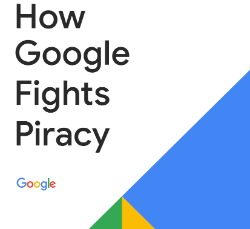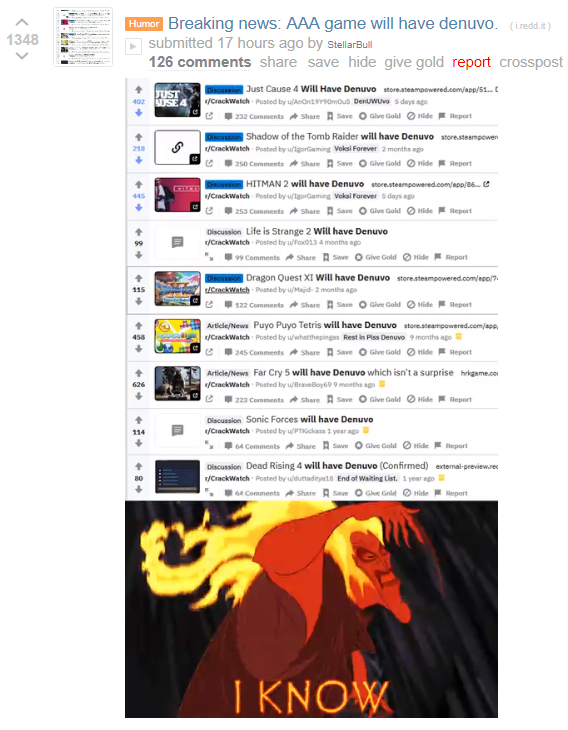 The entertainment industries have repeatedly accused Google of not doing enough to limit piracy while demanding tougher action.
The entertainment industries have repeatedly accused Google of not doing enough to limit piracy while demanding tougher action.
For its part, Google regularly publishes updates on the extensive measures it takes to limit piracy on its platforms.
The company has today released the latest iteration of its “How Google Fights Piracy” report. It highlights how the company generates billions in revenue for the entertainment industries while at the same time takes measures to counter copyright infringement.
The company explains that its anti-piracy efforts are guided by five principles, starting with more and better legal alternatives.
“Piracy often arises when consumer demand goes unmet by legitimate supply. The best way to battle piracy is with better, more convenient, legitimate alternatives to piracy, which can do far more than attempts at enforcement can,” Google writes.
The other principles include a “follow-the-money” approach, effective and scalable anti-piracy solutions, protection against abuse such as fabricated copyright infringement allegations, and transparency.
A large portion of the report describes Google’s policies and results regarding web search. The company stresses that it doesn’t want to link to any pirated content, but that it relies on copyright holders to pinpoint these URLs.
“Google does not want to include links to infringing material in our search results, and we make significant efforts to prevent infringing webpages from appearing,” the company writes.
“The heart of those efforts is cooperation with creators and rightsholders to identify and remove results that link to infringing content and to present legitimate alternatives.”
Aside from removing more than three billion URLs in recent years, the search engine also helps to promote legal alternatives. This includes “knowledge cards” (which, incidentally, have featured pirate links too), as well as offering copyright holders SEO advice.
Earlier this year we reported that the number of takedown notices was starting to decrease for the first time in years, and Google confirms that observation in its report.
“The number of URLs listed in takedown requests decreased by 9%, reversing a long-term trend where the number of URLs requested for removal increased year-over-year,” the company writes.
Last year, Google was asked to remove 882 million URLs in total, of which 95% were removed. In addition, more than 65,000 sites that were flagged persistently have been demoted in search results, lowering their visibility.
This demotion measure is “extremely effective” according to the search giant.
“Immediately upon launching improvements to our demotion signal in 2014, one major torrent site acknowledged traffic from search engines had dropped by 50% within the first week,” Google notes, citing a TorrentFreak report.
Perhaps more importantly, Google’s demotion measures also passed the tests that were carried out under the Voluntary Code of Practice that Google entered into alongside Microsoft and major UK rightsholder organizations.
This agreement was signaled by the rightsholders as a landmark deal and, reportedly, Google is doing well.
Thus far, four rounds of tests have been carried out to check whether search engines sufficiently limit the availability of infringing content. These are based on guidelines set by the UK’s Intellectual Property Office (IPO). Google passed them all.
“Thanks to the demotion signal and our other efforts to surface legitimate results in response to media-related queries, Google Search has passed the test every time with flying colors — scoring considerably under the thresholds agreed with the IPO,” Google reveals.
This suggests that the search engine doesn’t have much to fear from the UK Government, which previously warned that “legislative” measures could follow if search engines didn’t step up their game.
While Google says that it’s doing its best, the company is convinced that search is not a major driver to pirate sites and stresses that they don’t control what is on the web.
The company reiterates its earlier position that removing entire domains from search results is unacceptable, as that would restrict access to legitimate content as well. Similarly, “filtering” the entire web for pirated content is not an option either.
“It is a myth that Google could create a tool to filter the web for allegedly infringing material and remove images, video, and text from our search results proactively. Such a system is both infeasible and unnecessary,” Google writes.
Aside from search, Google has also removed content from its other services including YouTube, Google Drive, and Google images. Some of these services were extensively abused by streaming sites last year, but Google says it has taken steps to counter this.
Finally, no anti-piracy report these days would be complete without a Kodi mention. The streaming software, which is perfectly legal in its own right, is regularly used in combination with third-party piracy add-ons.
Google, which banned the term Kodi from its auto-complete feature, says it removed several set-top boxes with “suspicious” add-ons from Google Shopping. In addition, the Play Store is closely monitored to flag apps with pre-installed pirate Kodi add-ons before they appear online.
In closing, Google notes that it remains committed to fighting piracy on all fronts, albeit not at all costs.
“Through continued innovation and partnership, we’re committed to rolling back bad actors while empowering the creative communities who make everything we love about the internet today.”
—
A copy of the most recent “How Google Fights Piracy” report is available here (pdf).
Source: TF, for the latest info on copyright, file-sharing, torrent sites and more. We also have VPN reviews, discounts, offers and coupons.

 It is no secret that copyright holders are monitoring unauthorized downloads around the world.
It is no secret that copyright holders are monitoring unauthorized downloads around the world.

 The entertainment industries have repeatedly accused Google of not doing enough to limit piracy while demanding tougher action.
The entertainment industries have repeatedly accused Google of not doing enough to limit piracy while demanding tougher action.
 For roughly two decades, copyright holders have been sending ISPs takedown notices to alert account holders that their connections are being used to share copyrighted material.
For roughly two decades, copyright holders have been sending ISPs takedown notices to alert account holders that their connections are being used to share copyrighted material.